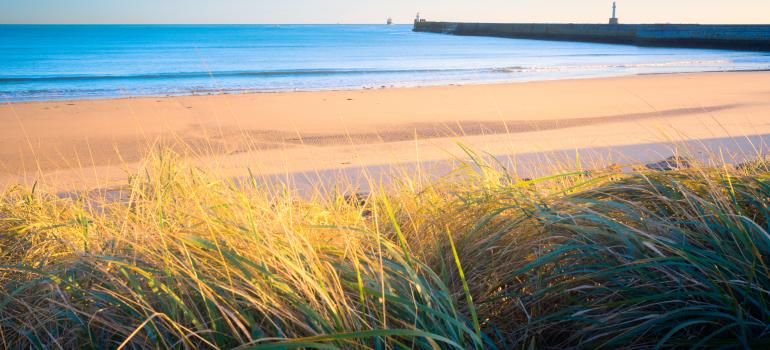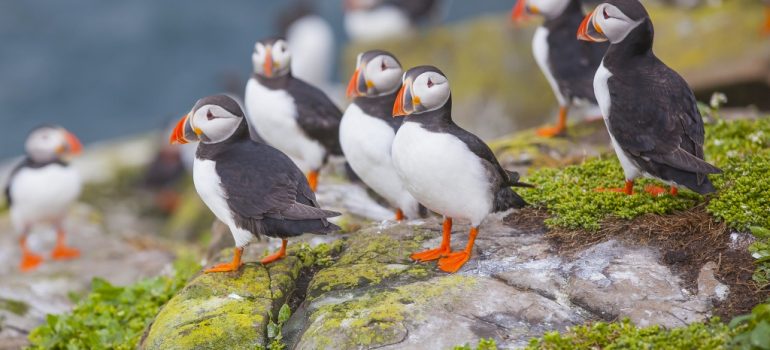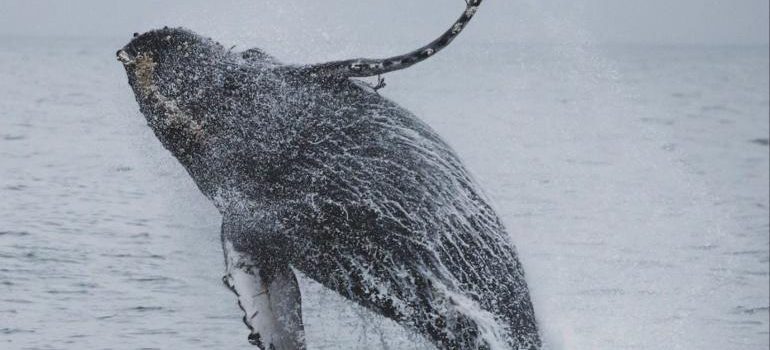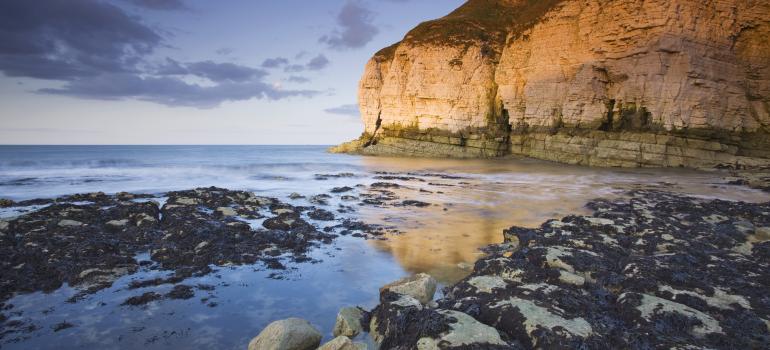Across the globe, the cruise industry is working to improve sustainability, to implement and develop new technology for cleaner, greener ships and to preserve the oceans and environments on which the industry depends.
The latest information on the greening of the global cruise fleet can be found here.
UK ports and service providers are also developing initiatives, harnessing new technology and rolling out improvements that allow them to fulfil customer requirements whilst reducing their carbon footprint and working to preserve the environment.
Below is just a snapshot of how Cruise Britain’s members are working to achieve carbon reduction goals and protect our environment.
- Network of over 100ha of wildlife corridors and green areas in the Port Estate, managed according to an Ecological Management Plan
- Protecting and enhancing a range of wildlife rich habitats, including meadows, woodland, wetlands, reed beds and saltmarsh
- Delivering nature-based solutions for carbon storage, including habitat creation, woodland management and tree planting, and saltmarsh restoration
- Long term programme of environmental projects such as water vole re-introduction, an owl conservation programme and saltmarsh grazing
- Energy efficiency and optimisation initiatives (e.g. switching to LED lights and anti-idling campaigns)
- Transitioning to 100% electric white fleet and small/medium electric cargo handling equipment (e.g. forklifts)
- Exploring opportunities for alternative low and zero emission fuels in larger plant and harbour vessels, such as biofuel (HVO), hydrogen, ammonia and methanol
- Three wind turbines in Avonmouth dock generate around 35% of BPC’s electricity requirements
- Promoting further renewable energy in the Port, including solar panels on warehouse roofs
- Working in partnership with others to find longer-term zero-emission solutions for the region (e.g. Hydrogen South West)
- Promoting Active Travel in the Port (e.g. cycle to work scheme)
- Monitoring air quality and noise within the Port Estate
• Launch of new electric water taxi Phoebe, reducing carbon emissions on passenger transport across the harbour
• Water quality monitoring in partnership with Friends of the Dart, ensuring the long-term health of the estuary
• Saltmarsh Restoration Project led by Dart Harbour with multiple partners, funded by the Environment Agency, to study, conserve and restore saltmarsh habitat across the Dart Estuary
• 64-amp shore power connection installed on Dartmouth Town Jetty, enabling larger vessels to reduce generator use and cut exhaust emissions on the river
• Supporting a five-year partnership to provide every local primary pupil with regular, high-quality swimming lessons, promoting lifelong skills, community wellbeing, and the sustainable use of local facilities.
• Part of the South Devon National Landscape, helping protect and fund the management of this nationally important environment
• Dart Harbour Office powered by 100% renewable energy, eliminating carbon emissions from daily operations
• Cycle-to-work scheme introduced for Dart Harbour team members, encouraging low-carbon commuting
- Head office relocation to A1 spec low energy office
- Participation in Travel Life sustainability programme
- Electric cars used for airport transfers and in large cities
- Low emission coaches used for all excursions plus a no idling policy
- Orkney office is 100% powered by renewable wind turbine energy
- Winner of most sustainable medium sized organisation at Cornwall Sustainability Awards (2024)
- Installation of Cleaner Seas filters to eliminate plastic microfibre pollution from washing machines (2024)
- Blue Meadow Buoys marking 30 hectares of seagrass and 69 hectares of maerl (2023-25), helping to protect habitat of over 150 football pitches in size
- Habitiles and Intertidal reef cubes deployed resulting in an uplift of biodiversity of nearly 7% in a year (2024)
- Water Quality monitoring ongoing with Smart Ports, Clean Waters Project (2024-25)
- New Pilot Boat proving to be very efficient reducing the carbon intensity of our pilotage operation, will soon be run on HVO to reduce carbon emissions further in 2025
- Rapid electric charger to be installed on pontoons to serve new electric rib due, making the cruise channel clearances routinely emission free (2025)
- As part of UK SHORE/Innovate funded ZENOW (Zero Emission Network of Workboats) – via the ZEVI programme, our first electric workboat and charging unit will commence operating in 2025, joining a UK-wide network of 20 vessels.
- Multiple Air Quality sensors and monitoring in the harbour.
- Acquatic Invasive Non-Native Species Plan.
- Beach cleans and Kayak based cleans.
- LED Upgrades on all office lighting.
- Introduction of fully electric STS cranes to replace diesel and HVO (2024)
- Switch all port vehicles from Diesel/petrol to Electric (2023)
- Switch from diesel to HVO for all container handling equipment (2022)
- Peel Ports Net Zero commitment for 2040
- Working with local suppliers to reduce the carbon footprint of supply chains
- Reduced single-use plastics across all operations
- Vehicle suppliers must adhere to our ‘Sustainability Criteria’ ensuring waste is disposed of in an eco-conscious manner, natural light and ventilation is encouraged and idle-ing actively discouraged
- Offsetting carbon emissions from travel by planting climate-resilient, native tree species across the UK. We have currently planted 150 (correct as of August 2025)
- Sponsoring community events in locations we visit on our tours
- Donate a per-person visitor fee in selected locations to fund village/destination restoration projects
- Advice is provided to customers on locations we visit with simple ways to support the community and environment, encouraging a positive impact
- UNESCO Biosphere Reserve Status
The only entire nation designated as a UNESCO Biosphere Reserve. This status underpins sustainable tourism and environmental stewardship across the island. - Global Sustainable Tourism Council (GSTC) Accreditation:
The Isle of Man has received full GSTC accreditation. Recognised for meeting international standards in environmental, social, and economic sustainability for tourism.
This film explores how the Isle of Man, a UNESCO Biosphere Reserve, is embracing sustainability across its landscapes, communities, and tourism industry – A whole nation biosphere reserve | Visit Isle of Man | Travel Redefined
- On target to achieve Net Zero on defined Scope 1 & 2 Emissions 2025 includes all port vehicles, plant, tugs, pilot boats, etc now run on biofuel
- Zero waste to landfill achieved in 2023 (excludes Cat 1 waste as per govt regs).
- Continuation of SeaAward recognising the cruise vessel’s performance on various waste management-related metrics
- Monitoring of water quality including bathing water
- Monitoring of marine ecology including trawling, benthic fauna, littoral surveys, marine mammal sightings, algae.
- Monitoring of terrestrial ecology including ground flora, ornithology.
- Monitoring of air quality
- Community relationship through maintenance of a large area of public realm along waterfront and promenade
- Shore power now available at two terminals and one terminal upgraded to take LNG ships
- Recycling: Nearly 100% of general garbage ships waste being recycled or sent for energy recovery
- Port Renewable Energy Generation: 7 Solar PV arrays including more than 7,000 solar panels
- Biosecurity Management on hulls to reduce the risk of invasive non-native species and provide fuel efficiency gains
- Electric Vehicle Fleet + EV charging points for passengers
- Street Lighting, High Mast Lighting and terminal LED upgrades
- Port Air Quality Monitoring and Strategy including rail upgrades and no idling; air quality across the port is 25% better than national target levels
- Cycling Infrastructure upgrades
- Beach Cleans
- Hybrid/electric vehicles: ongoing vehicle replacement
- Air quality survey
- Breakwater cleaning
- Aquatic Invasive Non-Native Species Plan
FUTURE PLANS
- Waste to energy for shore power
- Solar energy evaluation
- Introduction of HVO (2024). Replacing diesel on site, drop in fuel for remaining assets on diesel power
- Terminal extension (2023) carbon neutral terminal building
- Solar array (2022-2023) 1.2 MW peak system with battery
- Electric vans (2021) 4 new electric vans to replace fleet
- Shore power for tugs (2021) shore power at berth 1 for SMS tugs
- Air quality sensors (2021) monitoring AQ on site for over 3 years
- LED lighting (2020) installed across site
- Electric vehicle charging (2021) 4 staff, 2 public
- Low energy linkspans (2018) installed on berth 4
FUTURE PLANS
- Net-zero 2030
- Emissions free 2050
- Sea Change shore power (2025)
- LNG bunkering (2025)
- Under evaluation: wind turbines, additional solar, HGV Electric charger,future fuels
- Cycle-to-Work Scheme – Encouraging sustainable commuting by supporting employees in choosing cycling as an eco-friendly transport option.
- Electric Baggage Tow Tractors & Forklifts– Reducing emissions and improving energy efficiency in our operations.
- Transition to Electric Buses – Phasing out diesel vehicles for staff transport in the port.
- EV Charging Points – EV charging points installed at all operational locations where allowable.
- Electric Baggage Conveyors – Implementing energy-efficient conveyors to reduce our environmental impact in baggage operations.
- On site sustainability assessment of stands and awards of Better Stands ratings
- Exhibitors can donate stand furniture to local charities
- Recycled carpets for event flooring
- Energy efficient LEDS for event lighting
- Quarterly review and event catalogues 100% digital
- Charitable partner for all events is Mercy Ships
- Fully electric JCB teletrucks
- Electric self-help trolleys collector tugs
- Electric counterbalance fork trucks used for baggage and unloading stores





